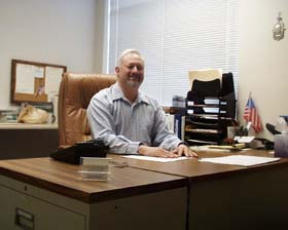Upon arrival to the Center for Independence, it didnt take long for me to grasp (albeit on a small level) the difficulties facing individuals with disabilities. The organizations executive director, Cliff Schulman, made a point of that.
Are you comfortable? he asked. Schulman sat behind his desk. The blinds were closed, lights were off, and I was left with no place to sit. Initially, I shrugged this off. But as the interview proceeded, it was clear that things were awkward. Im blind, Schulman explained. It doesnt matter to me whether its dark or not. I also have the only seat in the room. Its not because Im a jerk. Its because if you come into a job or a workplace, and you dont have a chair, or dont have a space when everybody else has a space, this is how you feel.
Point taken. The exercise was meant to illustrate the difference between accommodation (a word which makes Schulman bristle) and equal access. True: when I met Schulman, I expected to interview him in a well-lit office, with a place to sit. I expected Schulman to accommodate my needs, rather than create an environment of equal access.
This is part of what we do here at the Center for Independence, Schulman explained, switching on the lights and retrieving a chair. We are about equal access.
The Center for Independence started in 1992 as part of Good Samaritan Hospital. Two years ago, the organization separated from the hospital, and is now located in an office in Lakewood. The non-profit center serves as a resource for individuals with disabilities to fully access and participate in communities through outreach, advocacy and skills development. The center works with people with disabilities, their communities, and businesses to educate all people of their responsibilities toward people looking for jobs and wanting to be part of the community.
The center achieves this goal several ways.
The first: set an example. The center is heavily involved in the Lakewood business community. Schulman is an ambassador for the Lakewood Chamber of Commerce, and serves on a couple boards of businesses. Also, the center handles benefits management for several government agencies in the Puget Sound region. We are involved heavily in the community, said Schulman. The reason for that is Im disabled, there are other people that work here who are disabled, and they are working as equal parts of the community. Not only are we teaching that people can work and have equal access, but were setting an example. Here we are. We have disabilities. And we are working as equal parts of the community.
The second: stress the importance of equal access, not accommodation. The biggest hurdle is manufacturing. Though employment laws dictate equal access, the manufacturers that design workplace equipment (e.g., copiers, telephones, computer software) fail to incorporate the law into their products. A classic example is the photocopier without braille pads or audio devices to assist blind people. Another example is the TTY machine that serves deaf people, but has no audio function to serve blind people. Manufacturers are not keeping up with what the law says, Schulman explained. You want to make things in such a way that the employer only has to buy one item and it works for everybody. But what about the drive-thru ATM with braille key pads? Thats the most brilliant manufacturer, Schulman said. Why? They make one item, they make it for everybody, and they make it perfect. If its not in the drive-thru anymore, they pull it out and put it in another spot. And everyone can use it. Thats the concept were teaching. Were teaching that you make things accessible to everybody.
Manufacturing design is particularly important to Schulman. Before losing his sight thirteen years ago (the result of a viral infection; he lost his sight in three days), Schulman was a design engineer. After six months of soul-searching and support from friends, he came to a decision that he was ready to go on with his life. I had a fantastic counselor at the Department of Services for the Blind, he explained. At the time, though, I thought she was ridiculous. She told me I should work just as I had before. I couldnt. I was blind. She said, Well, youre an illustrative designer. How did you draw pictures? Did you go out and look at things, or did you conceptualize them? Of course, I conceptualized them.
That said, Schulman started to provide design-accessibility expertise overseas. He spent eight years in the Middle East, working for the Ministries of Tourism in Jordan, Egypt, and Israel. He also worked at the British Museum Gallery and the Royal National Institute for the Blind in London.
He returned to Washington state and landed work at the center, which has provided design-accessibility expertise to organizations such as Sound Transit, Pierce Transit, the City of Tacoma, the City of University Place, and the Department of Social and Health Services.
The Center for Independence also provides vocational training for individuals with disabilities and looking for employment. The center evaluates each candidates needs and capabilities and provides coaching, computer resources, and referrals.
People with disabilities have rights and responsibilities, Schulman explained. I have a right to have a job. My responsibility is educating myself to get a job, and presenting myself in a proper manner.
The Center for Independence will be hosting its first-annual Winter Solstice Celebration, a fund-raising event hosted by HomeStreet Bank, on Nov. 23, 2004. For more information, contact (253) 582-1253 or visit http://www.centerforindependence.com








